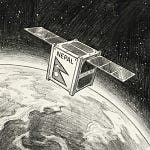Share the love! Help others that care about Nepal stay up to date the easy way. If you like this issue, share it with a friend who follows Nepal and hit Subscribe for your weekly dose of curated, can’t-miss updates.
From flame-kissed temples in Mustang to the chilly diplomacy of Everest, Nepal’s had a busy week balancing reform, resilience, and a bit of rallying. While lawmakers wrangle over federal bureaucracy and Everest braces for another human traffic jam, a mountain summit of a different kind—Sagarmatha Sambaad—gave Nepal a global microphone on climate. Let’s dig into the news that kept the nation moving (and occasionally stuck at base camp).
Economy & Development 💸
Nepal’s shadow economy now swallows half of national output, placing the country among just three globally—alongside Sierra Leone and Niger—where informal activity exceeds 50 percent of GDP, Republica reports, citing new IMF-based data. At 51 percent, the scale of Nepal’s grey economy dwarfs the global average of 11.8 percent and far surpasses even the 42 percent norm in other low-income countries. This includes everything from informal retail shops and unlicensed transport to large-scale smuggling, corruption, and cash-based services that operate outside the tax net. Economists say such widespread informality weakens Nepal’s ability to collect revenue, plan effectively, and attract investment—raising borrowing needs and undermining public trust in the state. Despite multiple government promises to formalise the economy—through digital payments, simplified tax slabs for small traders, and better regulatory enforcement—progress has stalled due to limited capacity, political interference, and inconsistent leadership. Critics point out that efforts to expand the formal base often stumble over bureaucratic red tape or lack of buy-in from the very sectors they aim to include. With public infrastructure projects underfunded and fiscal deficits rising, the government faces a fundamental challenge: how to bring millions of informal transactions under the regulatory umbrella without choking off livelihoods. As Nepal plans new fiscal reforms, this shadow economy figure underscores why meaningful change must begin with institutional reform and trust-building from the bottom up.
Remittances remain Nepal’s economic shock absorber, rising 10 percent to Rs 1.191 trillion in the fiscal year’s first nine months, OnlineKhabar notes. Yet that lifeline carries a human cost: 584 Nepali workers died or were gravely injured overseas during the same period, with Rs 662 million paid to families, according to Republica, which also flags accounting lapses that could delay further compensation. The stark contrast between booming inflows and silent tragedies shows how labour migration is both Nepal’s financial ballast and its greatest vulnerability, spurring calls for stronger consular protection, mandatory insurance enforcement and real reintegration support at home.
Fiscal discipline is wobbling even as reform flickers. With two months left in the fiscal year, only 34 percent of the development budget is spent and arrears have ballooned to Rs 733 billion, warn OnlineKhabar and Republica. Yet foreign-direct-investment pledges are up 33 percent after one-day approvals, KTM Post reports, and the Nepal Electricity Authority is close to resolving an Rs 8 billion dues feud with industry. Beyond the capital, Gandaki Province has legalised ride-hailing, the 25-MW Seti River plant is on the grid, Melamchi water now reaches new Kathmandu neighbourhoods, and a Japanese grant is fast-tracking a trauma centre at Dhulikhel Hospital—incremental wins that show targeted reforms and infrastructure completions can still nudge the economy forward even as budget discipline lags.
Politics & Governance 🪧
Nepal has finally taken a long-overdue step toward administrative federalism with the endorsement of the Federal Civil Service Bill by a parliamentary committee, nearly a decade after the 2015 constitution envisioned such a reform. As reported by both Republica and KTM Post, the bill was finalised after intense negotiations between major parties, with Prime Minister KP Sharma Oli and Nepali Congress President Sher Bahadur Deuba personally brokering a compromise on key issues like the retirement age for civil servants (now to rise to 60) and a two-year cooling-off period before retirees can hold constitutional positions. The legislation also restructures bureaucratic ranks by reviving the Additional Secretary position and redefines how federal and provincial governments share recruitment responsibilities for local officials—a key step in devolving real authority to the provinces. While the bill must still pass the full House, its committee approval marks the most serious progress yet toward making Nepal’s federal system function as designed.
Meanwhile, the country’s anti-graft watchdog made headlines by indicting a sitting MP and former minister in a sprawling Rs 3.21 billion corruption scandal. The CIAA has filed charges against Mohan Bahadur Basnet and 15 others in connection with the controversial procurement of a telecom monitoring system known as Teramocs, seeking long prison terms and full financial restitution. According to KTM Post and OnlineKhabar, Basnet is accused of bypassing regulations to push through the surveillance project—despite no budget, feasibility study, or legal framework. Although other former ministers were investigated, only Basnet has been charged, triggering criticism about selective prosecution. The case, involving a Lebanese contractor, alleged bid rigging, and hardware delivered without software, underscores enduring dysfunction in public procurement and digital governance.
On the diplomatic front, Prime Minister Oli has had a visibly busy week of high-level engagements. He met with the Vice Chair of China's National People’s Congress, Xiao Jie, ahead of the Sagarmatha Sambaad, as covered by THT, and also hosted a Russian delegation led by Batu Khasikov, who invited Oli to an upcoming Buddhist conference in Kalmykia. Oli used the occasion to urge Moscow not to recruit Nepali nationals into its army. Meanwhile, Foreign Minister Arzu Rana has continued her diplomatic push to secure the release of Nepali student Bipin Joshi, abducted by Hamas last year, reiterating her appeal in a meeting with Qatar’s special envoy, according to Republica. These engagements reflect Nepal’s balancing act on both regional diplomacy and human rights advocacy.
Social & Cultural ⭐
Calls to make sex education mandatory in Nepal’s schools are gaining new urgency, as educators and public health advocates warn that adolescent awareness remains dangerously low. At a recent policy forum hosted by the Beyond Beijing Committee, panelists emphasized that many students avoid health education courses due to stigma, while teachers often lack proper training and institutional support. As Republica reports, health education remains optional in grades 9 and 10, leaving a major gap in youth access to vital information on sexual health, disease prevention, and bodily autonomy. Advocates are now urging the Ministry of Education to embed health and sexuality education into the national curriculum as a required subject, arguing that informed students are more empowered to protect themselves and challenge harmful norms.
Meanwhile, efforts are underway to enhance cultural tourism in the Mustang region, where local officials and residents are pushing to develop Muktinath into a more connected and immersive pilgrimage destination. A new trekking route is being proposed to link the revered Muktinath temple with surrounding religious heritage sites, following a feasibility study led by the district administration, according to OnlineKhabar. In parallel, the spring climbing season on Everest is facing yet another logjam, as erratic weather has narrowed the summit window, raising fears of crowding and risk in the death zone. Although the route to the top opened earlier than usual, high winds have delayed most teams, putting over 1,000 climbers—including guides—on standby. As KTM Post notes, this could trigger a bottleneck reminiscent of past deadly traffic jams on the mountain.
Amid these challenges, there’s a bright spot in women’s sport: Nepal’s national women’s cricket team has advanced to the Super 3 stage of the ICC T20 World Cup Asia Qualifiers. After edging out Hong Kong based on match wins, the team now prepares to face top-seeded UAE and Thailand in the next round. Republica and OnlineKhabar highlight the breakout performance of captain Indu Barma and the rising excitement surrounding Nepal’s shot at global qualification. While the road ahead is tough, this campaign reflects a broader rise in visibility and momentum for women’s sports across South Asia.
Diaspora & Globalization 🌏
Nepal positioned itself as a serious voice in global climate diplomacy this week with the launch of the inaugural Sagarmatha Sambaad, a three-day high-level dialogue focused on “Climate Change, Mountains, and the Future of Humanity.” Held in Kathmandu and inaugurated by Prime Minister KP Sharma Oli, the event brought together over 350 delegates—including representatives from India, China, Bhutan, and leading international institutions such as the UN, World Bank, and ICIMOD. In opening remarks, PM Oli described mountains as the Earth’s “climate pulse,” underscoring the urgency to protect the Himalayas not only for regional resilience but global sustainability. Nepal used the platform to spotlight its proactive steps—unveiling its third Nationally Determined Contribution (NDC-3) and announcing the Biennial Transparency Report (BTR)—key requirements under the Paris Agreement. Foreign Minister Arzu Rana Deuba called for deeper collaboration between governments, donors, and civil society to unlock more effective climate finance and mountain-focused solutions.
From glacier retreat to water insecurity, Nepal’s message was clear: protect mountains to protect the planet. The dialogue served as both a policy forum and a diplomatic coming-of-age, with participants emphasizing the need for early warning systems, mountain-specific risk assessments, and sustainable tourism practices. As Nepal News explains, Sagarmatha Sambaad is designed as a recurring global platform that amplifies the voices of mountain nations and vulnerable communities often sidelined in mainstream climate summits. Though Nepal couldn’t secure heads of state this time, the symbolic location, timely theme, and depth of engagement signaled a bold ambition: to turn Sagarmatha—Everest itself—into a permanent beacon for environmental diplomacy. If future editions build on this momentum, Nepal could become a convening force for climate justice from the world’s rooftop.
Did you know ❓
In Nepal’s Mustang district, the Jwala Mai Temple at Muktinath hosts a rare natural phenomenon: a blue flame that burns perpetually from a rock wall above a sacred spring, fueled by underground natural gas. Revered by both Hindus and Buddhists for centuries, it symbolizes the union of earth, fire, and water. This natural flame—also called Sale Mebar (burning soil)—is believed to be one of the only places on Earth where fire and water coexist naturally in a place of worship. Learn more via Wikipedia
Let’s connect
Enjoying this issue? 📩 Share it with a friend & let’s keep Nepalis worldwide in the loop! Got thoughts? Hit reply—we’re all ears! Or let us know what you think via our Feedback form or follow us on Facebook | LinkedIn
P.S. Got a story or issue you'd like us to cover next week? Drop us a reply — we're building this space together.
About Nepali Diaspora Digest:
The Nepali Diaspora Digest connects the global Nepali community with curated news, insights, and stories that matter most. Join us as we celebrate and explore the diverse voices and achievements of Nepalis worldwide.
Partner shout out
belayat.uk: helping Nepalis connect in the UK on jobs, housing, events and finding local Nepali owned businesses
















